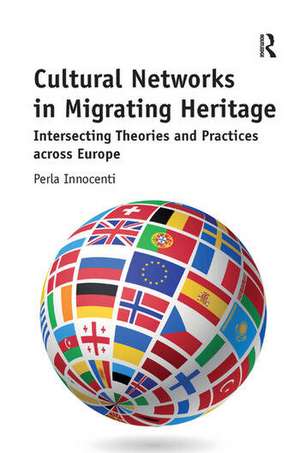Cultural Networks in Migrating Heritage: Intersecting Theories and Practices across Europe
Autor Perla Innocentien Limba Engleză Hardback – 28 ian 2015
Preț: 497.45 lei
Preț vechi: 665.91 lei
-25% Nou
Puncte Express: 746
Preț estimativ în valută:
95.23€ • 97.94$ • 79.00£
95.23€ • 97.94$ • 79.00£
Carte tipărită la comandă
Livrare economică 17 februarie-03 martie
Preluare comenzi: 021 569.72.76
Specificații
ISBN-13: 9781472448132
ISBN-10: 1472448138
Pagini: 180
Dimensiuni: 156 x 234 x 17 mm
Greutate: 0.48 kg
Ediția:1
Editura: Taylor & Francis
Colecția Routledge
Locul publicării:Oxford, United Kingdom
ISBN-10: 1472448138
Pagini: 180
Dimensiuni: 156 x 234 x 17 mm
Greutate: 0.48 kg
Ediția:1
Editura: Taylor & Francis
Colecția Routledge
Locul publicării:Oxford, United Kingdom
Notă biografică
Perla Innocenti is a cultural heritage and information studies scholar. She is Senior Lecturer in Information Science at the iSchool of Northumbria University and Honorary Research Fellow at the School of Culture and Creative Arts, University of Glasgow. Her research and publications cross disciplinary boundaries between cultural heritage, museum studies, cultural informatics, library and information science. In particular she has a passion for investigating the ways cultural collections can be acquired, managed, preserved, accessed, displayed and interpreted in a digital world. Perla has a PhD from the University of Glasgow, a MA from Scuola Normale Superiore di Pisa, Research Fellowships from University of Glasgow and Politecnico di Milano. She led research as Principal Investigator and Co-Investigator in several national and EU-funded collaborative research projects, and worked in libraries and with museums. With Ashgate, Perla published Migrating Heritage (ed., 2014).
Cuprins
Introduction; Chapter 1 Migrating Heritage; Chapter 2 Cultural Networks Shaped; Chapter 3 Cultural Networks Weakened; Chapter 4 Cultural Networks Strengthened; Chapter 5 Coda;
Recenzii
'At a time when official European Union cultural policy promotes unity in diversity, Perla Innocenti’s volume offers an insightful new dimension for one of the key domains generating this cultural diversity: migration. Her concept of migrating heritage is novel and nuanced. Her focus on networks is exceptionally productive. This book is a must-read for heritage scholars, practitioners and policymakers.’
Helaine Silverman, University of Illinois at Urbana-Champaign, USA
'Every day we are in the midst of complex flows of information, knowledge and culture. Innocenti offers a robust and thoughtful account of the ways that networks make European cultural and heritage institutions work and that increasingly shape our working identities. This excellent book interrogates how cultural networks are practiced, the challenges they create, and potentials they offer towards addressing issues of diversity, mobilities and intercultural dialogue.’
Mike Robinson, University of Birmingham, UK
'At a time when intercultural understanding is more important than ever, this innovative book combines rigorous policy analysis and expert testimony with case studies from across Europe. As well as providing timely insight into migrating heritage, it offers inspiration for both policymakers and cultural institutions.’
Mark O'Neill, Glasgow Life, UK
'Europe since the last millennium has been buzzing with attempts to network heritage, especially in the service of creating a more united Europe. Perla Innocenti does a valuable service for those working in this field in reporting on a wide range of case-studies, highlighting the multiple forms that such networking can take, as well as the challenges that networking projects face, and the potential that they hold for contributing to more cultural connection in Europe in the future.’
Sharon Macdonald, University of York, UK
Helaine Silverman, University of Illinois at Urbana-Champaign, USA
'Every day we are in the midst of complex flows of information, knowledge and culture. Innocenti offers a robust and thoughtful account of the ways that networks make European cultural and heritage institutions work and that increasingly shape our working identities. This excellent book interrogates how cultural networks are practiced, the challenges they create, and potentials they offer towards addressing issues of diversity, mobilities and intercultural dialogue.’
Mike Robinson, University of Birmingham, UK
'At a time when intercultural understanding is more important than ever, this innovative book combines rigorous policy analysis and expert testimony with case studies from across Europe. As well as providing timely insight into migrating heritage, it offers inspiration for both policymakers and cultural institutions.’
Mark O'Neill, Glasgow Life, UK
'Europe since the last millennium has been buzzing with attempts to network heritage, especially in the service of creating a more united Europe. Perla Innocenti does a valuable service for those working in this field in reporting on a wide range of case-studies, highlighting the multiple forms that such networking can take, as well as the challenges that networking projects face, and the potential that they hold for contributing to more cultural connection in Europe in the future.’
Sharon Macdonald, University of York, UK
Descriere
This book highlights the strengths and benefits from new cultural networking practices but also the challenges and issues that arise. How can we leverage the power of cross-border cultural networks in a contested place such as Europe today? How can European cultural institutions elaborate the necessary approaches and strategies to achieve a type of cultural cooperation that is truly based on cultural practice? How can the actions of the European Commission and relevant cultural bodies in Europe be strengthened, adapted or extended to meet these goals? The book will be of interest to scholars and students in museum and cultural heritage studies, visual studies, sociology of organizations, cultural heritage management and information studies. It will also be relevant to practitioners and policymakers from museums, libraries, NGOs and cultural institutions at large.
